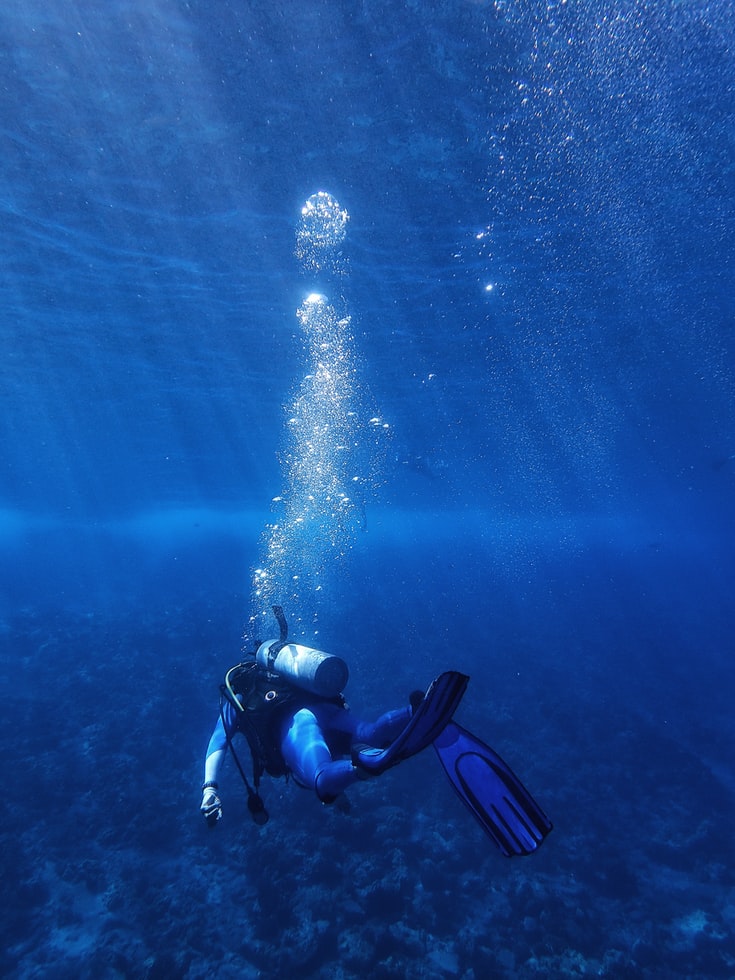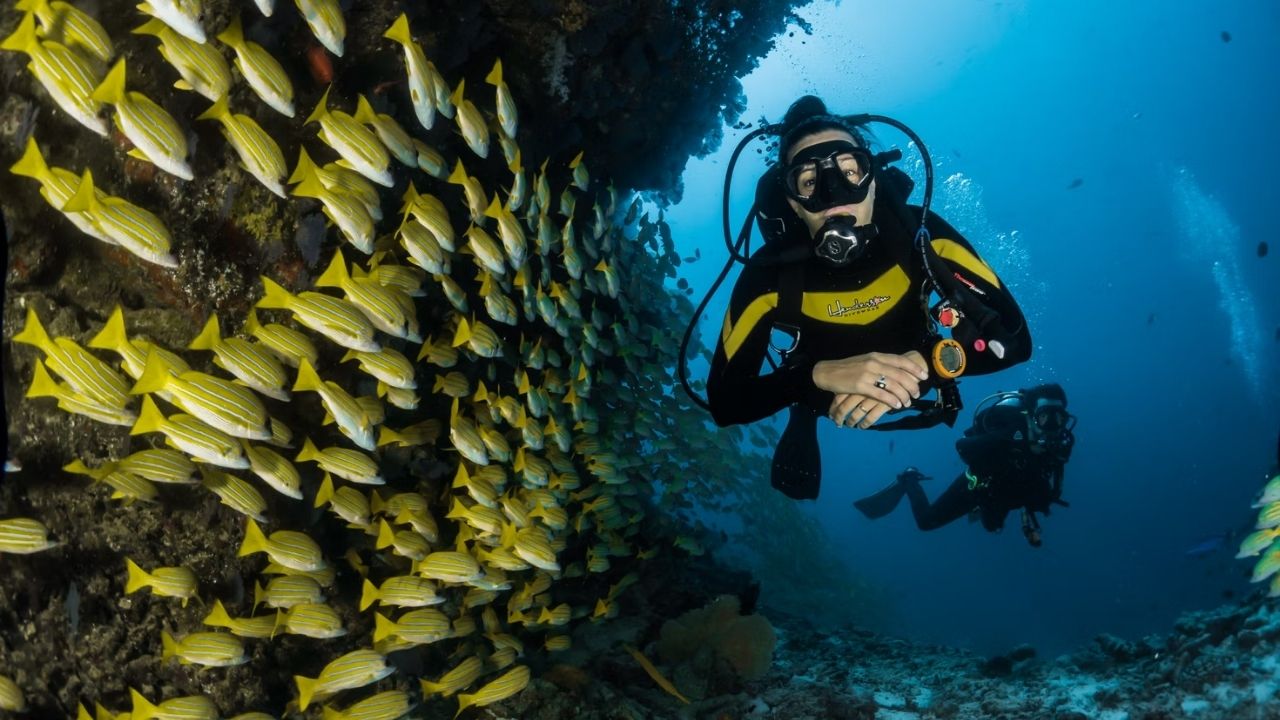Scuba diving in the beautiful marine is pretty safe compared to most extreme sports. And the security gear is even safer than skydiving’s double safety mechanism.
There’s one caveat, though – while injuries are rare in scuba diving, the sheer atmospheric pressure and loads of other physics-related stuff interacting with your body in deep waters can be uncomfortable for an unhealthy person.
In layman’s terms, scuba diving is a physically and mentally strenuous activity that isn’t for everyone. I’ll explain in detail – then we’ll discuss common medical conditions that prevent you from doing scuba.
What makes scuba diving different from other extreme sports?
According to the 2020 study, Medical Examination of the Recreational SCUBA Diver, “SCUBA diving is an enjoyable and safe sport when it is pursued by healthy, well-trained, disciplined and well-equipped individuals who are comfortable in the water. Since the sport diver is out for recreation, there is no need to take chances or shortcuts with any of these factors.”
Scuba diving is one of the most demanding sports for an unhealthy person because of one factor – water is denser than air. You can get away with a slight error with skydiving and other “above ground” extreme sports, but not with scuba diving.
In scuba diving, your body faces more pressure and exhaustion the deeper you go below sea level. Even with a full oxygen tank, your body deals with various forces like changing atmospheric pressure, which takes a massive toll on your inner ears and lungs.
That said, a relatively healthy human body can easily withstand most of these phenomena. Where exactly do we draw the line for the eligibility criteria?
Let’s find out.
Who should not go scuba diving?
People with medical issues related to lungs, heart, and brain should not go technical diving. Common conditions include asthma, cardiovascular diseases, pneumothorax, seizures, and diabetes. They may get away with recreational scuba diving if the issues are mild.
Medical Conditions That Stop You From Scuba Diving
Dozens of medical conditions could potentially stop you from scuba diving or other sports. The human body is complicated. So, to make this influx of information easy for you, I’ve categorized the conditions into eight sections.
1. Neurological Problems
People with neurological problems, especially the spinal cord or the peripheral nerves connecting the spinal cord to the brain, aren’t allowed scuba diving. Individuals with a history of seizures also fall in this category.

The strictness of these policies is subjective and varies among different locations. Some scuba diving instructors won’t allow you to dive even if you have a clearance certificate from a medical professional.
Scuba diving is not allowed for a person suffering from epilepsy. If you have been off medication and without a seizure for over 5 years, you might be considered fit to dive. For patients with nocturnal seizures, you have to be off medication for at least 3 years.
These strict rules are enforced because you can potentially have a seizure at any time, even if the possibility is super low.
Major Neurological Conditions:
- Seizures (less than 5 years)
- Epilepsy
- Multiple Sclerosis
- Paralysis
- Cerebrovascular insufficiency
- Parkinson’s Disease
- Aneurysm
- TIA strokes
2. Cardiovascular (Heart) Problems
Scuba diving is no walk in the park – the change in pressure not only affects your lungs (breathing) but also your heart (blood pressure). Diving can be difficult if you have high blood pressure or other cardiovascular problems.
For example, you can’t scuba dive if you have persistent hypertension, chest pains, and palpitations in addition to high blood pressure. A medical clearance certificate is almost always required in these situations. You can also get the certificate as a precautionary step if you have had cases of heart murmur and premature death in the direct family.
As for the hematological problems, you need to be careful as it increases the chances of getting decompression illness (DCI). It’s recommended to wait 6 months to a year after a heart attack or heart surgery before scuba diving.
Major Cardiovascular Conditions:
- Coronary artery/heart disease
- Cardiomyopathy
- Chronic immersion pulmonary edema
- High blood pressure
- Implanted cardiac defibrillator
- Pulmonary hypertension
More minor conditions include using a pacemaker and a single isolated case of pulmonary edema. Hematological problems include chronic anemia.
3. Mental Health & Behavioural Problems
This one is quite tricky because diagnosing behavioral and other mental health problems aren’t cut and dry. Additionally, you won’t be barred from having just about any random mental health condition.
The issue is the seriousness of the problem because that directly correlates to your medication. For example, you should NOT take psychotropic medications while scuba diving. If so, you’ll need medical clearance from a psychiatrist.

As I said, these conditions don’t matter as much as their intensity does since so many of these are very hard to evaluate for a scuba diving situation.
For instance, if you have severe depression, bipolar disorder, or psychosis, you might get medical clearance to scuba dive, but it may put your well-being at high risk.
Major Mental Health Conditions:
- Psychosis
- Bipolar Disorder
- Severe Depression
- Panic Attacks
- Severe issues of drug and alcohol abuse
- Claustrophobia/agoraphobia
4. Respiratory & Pulmonary Problems
You shouldn’t go scuba diving if you have asthma, as the conditions that might lead to an asthma attack are inherent to scuba diving. These attacks can tighten the airflow by constricting the muscles, which isn’t ideal underwater because it can lead to drowning.
Other pulmonary ailments are just as dangerous because they place a tremendous toll on your lungs and other parts of the respiratory system. This strain can often result in pulmonary over-inflation and alveolar ruptures – both of which can be fatal underwater.
An alveolar rupture is dangerous because it can accidentally bypass air in the bloodstream, leading to an arterial gas embolism (AGE). And an embolism like that underwater is the recipe for a stroke attack.
Major Respiratory Conditions:
- Pneumothorax
- Pulmonary hypertension
- Asthma
- Thoracic surgery
- Lung disease
5. Gastrointestinal & Metabolic Problems
It might sound far-fetched, but diabetes can prevent you from scuba diving. Severely diabetic or obese (BMI above 30) individuals usually can’t scuba dive in the United States because it can be fatal if your blood sugar levels are off.
Also, gastrointestinal problems / conditions are an absolute NO for scuba diving. Any gastrointestinal condition that leads to acid reflux, vomiting, perforation, and diarrhea will immediately get you off the boat – and for good reason because even one of these outcomes is enough to drown you.
Ps…pregnancy also prevents you from scuba diving.
6. Cancer Problems
You should not attempt scuba diving while on chemotherapy because chemo and radiation therapy are exhausting and bring your stamina levels to zero. Ideally, wait until after you’re fully recovered from the effects of your therapy.
Since cancer isn’t an exact problem, the scuba restrictions are variable as well. People with brain, lung, or colon cancer MIGHT have to leave scuba diving forever. Comparatively, individuals with other cancer types only require a medical clearance certificate to dive, provided that they’re healthy and have enough stamina.
7. Other Miscellaneous Problems
Musculoskeletal problems such as amputated legs and scoliosis can prevent you from scuba diving because you need the ability to move around, especially in colder waters with such heavy gear. Other such issues include disc prolapse, aseptic necrosis, and severe back pain.
You also need to be otolaryngological healthy to scuba dive. Since inner ears are inflexible like solids, they’re susceptible to rupturing as you go deeper. It’s also why you shouldn’t take scuba dives until sometime after inner ear surgery.
What should you not do after scuba diving?
As long as we’re on the topic of preventing scuba mishaps, here are the things you should not do after scuba diving.
1. Don’t go mountain climbing, skydiving, or other such activities
You must know by now that change in altitude has varying yet astounding impacts. Mountain climbing in the first 24 hours of scuba diving can even result in decompression sickness.
The same goes for skydiving, zip-lining, and related activities. Stick to the ground for the first 24 hours and avoid changing the elevation further. Although, you can skydive (and mountain climb, etc.) prior to scuba diving.

2. Don’t consume alcohol
Avoid alcohol (or at least don’t drink heavily) during the first 24 hours. Avoid any activity that causes dehydration because it also leads to decompression sickness.
3. Avoid massages right after diving
You may want that relaxing massage after a tiresome day of scuba diving. Still, you should ideally avoid it for the first 24 hours. And if you can’t avoid it, just get the normal one – deep tissue massages should be avoided at all costs. Deep tissue massages can mask the symptoms of decompression sickness and lead to a misdiagnosis.

